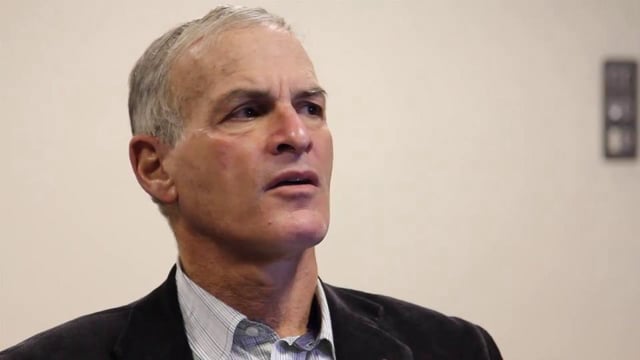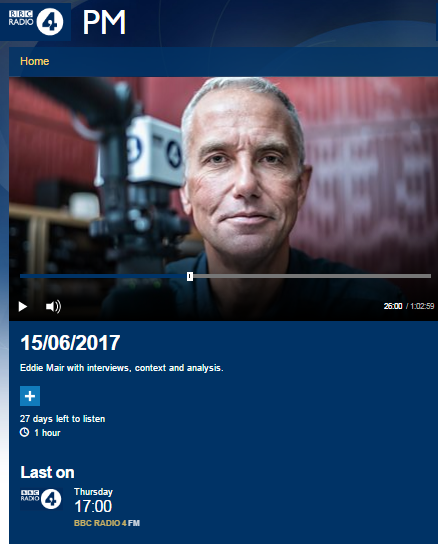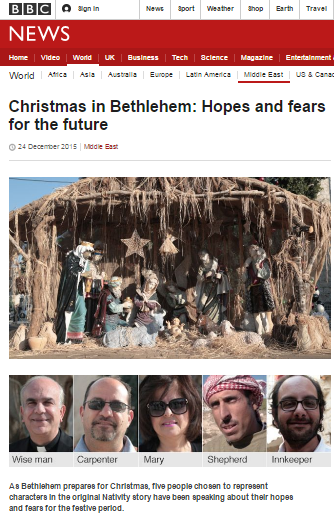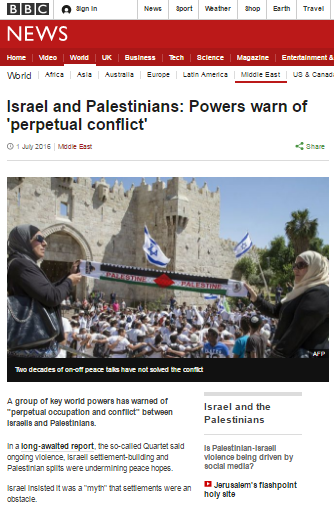On the evening of April 28th the BBC News website published an article titled “Kerry warns of ‘apartheid’ without Middle East peace” on its US & Canada page.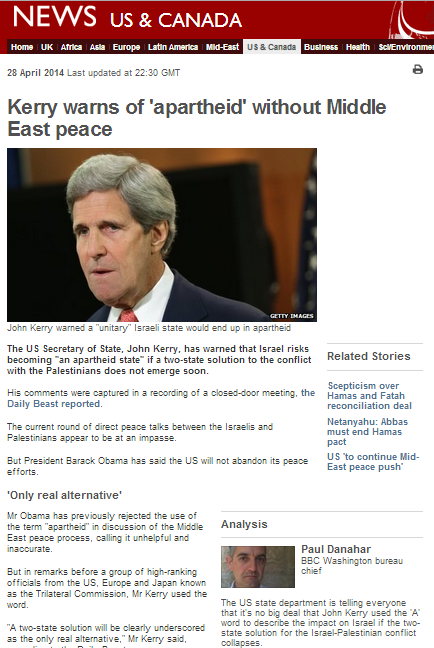
The report relates to remarks made by the US Secretary of State during a meeting of the Trilateral Commission.
Since the publication of Kerry’s remarks, and as noted in the BBC article, both condemnations and clarifications have been made, including an official statement from Kerry himself.
The most notable point about the BBC’s report on the subject – including the appended analysis by Paul Danahar – is that at no point does it attempt to clarify to audiences one very important issue of context to the story.
The BBC makes no attempt to explain the political background to the intentional use of the ‘apartheid’ trope and its significance in the context of the campaign of delegitimisation against Israel.
As we have noted here before:
“The small, but noisy, Boycott, Divestment and Sanctions movement (BDS) against Israel – led by its ‘high priest’ Omar Bargouti – has, according to him, three basic aims:
“… ending Israel’s occupation and colonisation of all Arab lands occupied since 1967; ending racial discrimination against its Palestinian citizens; and recognising the right of Palestinian refugees to return to their homes, as stipulated in UN resolution 194.”
As Norman Finkelstein (not one of the better known card-carrying Zionists) pointed out earlier this year, the makers of those demands have one end-game in their sights.
“They call it their three tiers… We want the end of the occupation, we want the right of return, and we want equal rights for Arabs in Israel. And they think they are very clever, because they know the result of implementing all three is what? What’s the result? You know and I know what’s the result: there’s no Israel.” […]
The methods used to try to bring about that end game include the delegitimisation of Israel: the attempt to paint a picture of a country so morally unacceptable that any ‘right-minded’ person cannot possibly tolerate its continued existence.
One way of doing that is to use the ‘apartheid’ trope. By deliberately employing rhetoric which the public associates with a universally morally unacceptable theme, the BDS movement aspires to brand Israel in the minds of the general public with the same stigma as the former racist regime in South Africa.
Of course a close and factual examination of the situation immediately reveals that the use of the ‘apartheid’ trope in relation to Israel is utterly unfounded. But sadly, many if not most members of the general public do not have sufficient knowledge of the facts to be able to assess the ‘apartheid’ trope for what it really is: a rhetorical tactic relying on the human mind’s natural tendency to make associations.”
In order to be able to understand the full significance of John Kerry’s use – intentional or not – of a theme promoted by some of Israel’s most virulent detractors and of the subsequent reactions to that use of such a loaded word, BBC audiences would have to be made aware of what the ‘apartheid’ trope means and who uses it.
Not only did that not happen in this article, but in his side-box of analysis, former BBC Jerusalem Bureau head Paul Danahar wrote: [emphasis added]
“The US state department is telling everyone that it’s no big deal that John Kerry used the ‘A’ word to describe the impact on Israel if the two-state solution for the Israel-Palestinian conflict collapses.
A spokeswoman has pointed out that senior Israeli politicians have also referenced apartheid before when talking about the risks to Israel’s reputation. This point though is frankly spin. It is one thing for Israeli politicians to use provocative language in their own political arena. When used by the US secretary of state it adds legitimacy to the debate about whether there is an equivalence between the old South African regime and the situation on the West Bank.
Whether the “apartheid” reference was a gaffe or deliberate there is no doubt that Secretary Kerry believes Israel’s government is stubbornly ignoring his warnings that a failure to agree a peace deal will feed a campaign trying to delegitimise their state.”
So as we see, not only does the BBC fail to inform readers of the political origins and aims of the ‘apartheid’ trope, its Washington Bureau chief and former Jerusalem Bureau head tells BBC audiences that there is a “debate” which already has “legitimacy” to be conducted on the subject.
Paul Danahar knows perfectly well that the vast majority of Palestinians live under either the Palestinian Authority or Hamas and vote for the legislative body which rules them and makes the laws which govern their lives. He also knows full well that Israeli policies and actions in Judea & Samaria have nothing to do with the skin colour or race of people living there, but are entirely security-related and aimed at preventing terrorism against civilians of all colours, races and creeds. And Danahar spent enough time in the Middle East to know exactly where the ‘apartheid’ trope comes from and the reasons for its employment.
But instead of using his specialist knowledge to clarify to North American readers why Kerry’s remark is so controversial and problematic, Danahar chooses instead to promote the falsehood that there is a “debate” to be had.

